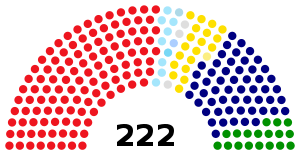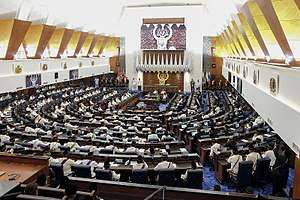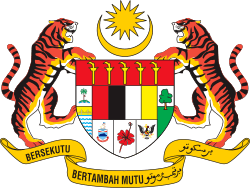Dewan Rakyat
| House of Representatives Dewan Rakyat | |
|---|---|
| 14th Parliament of Malaysia | |
 | |
| Type | |
| Type | |
| Leadership | |
Deputy Speaker | |
Deputy Speaker | |
Secretary |
Roosme Hamzah, Independent Since 26 December 2007 |
| Structure | |
| Seats |
222 Members of Parliament (MPs) Quorum: 26[2] Simple majority: 112 Two-thirds majority: 148 |
 | |
Political groups |
(As of 10 September 2018) Confidence and supply: Opposition: Gagasan Sejahtera (18)
United Alliance (1)
PBRS (1) |
| Committees |
5
|
| Elections | |
| Plurality: First-past-the-post (222 single-member constituencies) | |
Last election | 9 May 2018 |
Next election | 16 September 2023 or earlier |
| Meeting place | |
 | |
| Website | |
| www.parlimen.gov.my | |
 |
|---|
| This article is part of a series on the politics and government of Malaysia |
|
The Dewan Rakyat (Malay for House of Representatives, literally People's Assembly) is the lower house of the Parliament of Malaysia, consisting of members elected during elections from federal constituencies drawn by the Election Commission.
The Dewan Rakyat usually proposes legislation through a draft known as a 'bill'. All bills must usually be passed by both the Dewan Rakyat (House of Representatives) and the Dewan Negara, before they are sent to the King for royal assent. However, if the Dewan Negara rejects a bill, it can only delay the bill's passage by a maximum of a year before it is sent to the King. Like the Dewan Negara, the Dewan Rakyat meets at the Malaysian Houses of Parliament in Kuala Lumpur.
Membership
Members of the Dewan Rakyat are referred to as "Members of Parliament (MPs)" or "Ahli Dewan Rakyat" (literally "member of the Dewan Rakyat") in Malay. The term of office is as long as the member wins in the elections.
A member of the Dewan Rakyat must be at least 21 years of age and must not be a member of the Dewan Negara. The presiding officer of the Dewan Rakyat is the Speaker, who is elected at the beginning of each Parliament or after the vacation of the post, by the MPs. Two Deputy Speakers are also elected, and one of them sits in place of the Speaker when he is absent. The Dewan Rakyat machinery is supervised by the Clerk to the House who is appointed by the King; he may only be removed from office through the manner prescribed for judges or by mandatory retirement at age 60.[3]
As of the 2018 general election, Dewan Rakyat has 222 elected members. Members are elected from federal constituencies drawn by the Election Commission. Constituency boundaries are redrawn every ten years based on the latest census.
Each Dewan Rakyat lasts for a maximum of five years, after which a general election must be called. In the general election, voters select a candidate to represent their constituency in the Dewan Rakyat. The plurality voting system is used; the candidate who gains the most votes wins the seat.
Before a general election can be called, the King must first dissolve Parliament on the advice of the Prime Minister.[3] According to the Constitution, the Yang di-Pertuan Agong has the right at his own discretion to either grant or withhold consent to dissolve the parliament.
Powers and procedure
As the ultimate legislative body in Malaysia, Parliament is responsible for passing, amending and repealing acts of law.
Parliament's members are permitted to speak on any subject without fear of censure outside Parliament; the only body that can censure an MP is the House Committee of Privileges. Such "Parliamentary immunity" takes effect from the moment a member of Parliament is sworn in, and only applies to when that member has the floor; it does not apply to statements made outside the House. An exception is made by the Sedition Act passed by Parliament in the wake of the 13 May racial riots in 1969. Under the Act, all public discussion of repealing certain Articles of the Constitution dealing with Bumiputra privileges such as Article 153 is illegal. This prohibition is extended to all members of both houses of Parliament.[4] Members of Parliament are also forbidden from criticising the King and judges.[5]
The executive government, comprising the Prime Minister and his Cabinet, is usually drawn from members of Parliament; most of its members are typically members of the Dewan Rakyat. After a general election or the resignation or death of a Prime Minister, the King selects the Prime Minister, who is the Head of Government but constitutionally subordinate to him, from the Dewan Rakyat. In practice, this is usually the leader of the largest party in Parliament. The Prime Minister then submits a list containing the names of members of his Cabinet, who will then be appointed as Ministers by the King. Members of the Cabinet must also be members of Parliament. If the Prime Minister loses the confidence of the Dewan Rakyat, whether by losing a no-confidence vote or failing to pass a budget, he must either advice the King to dissolve Parliament and hold a general election or submit his resignation to the King. The King has the discretion to grant or withheld consent to the dissolution. If consent is withheld, the government must resign and the King would appoint a new Prime Minister that has the support of the majority of members of Parliament. The Cabinet formulates government policy and drafts bills, meeting in private. Its members must accept "collective responsibility" for the decisions the Cabinet makes, even if some members disagree with it; if they do not wish to be held responsible for Cabinet decisions, they must resign. Although the Constitution makes no provision for it, there is also a Deputy Prime Minister, who is the de facto successor of the Prime Minister should he die or be otherwise incapacitated.[6]
A proposed act of law begins its life when a particular government minister or ministry prepares a first draft with the assistance of the Attorney-General's Department. The draft, known as a bill, is then discussed by the Cabinet. If it is agreed to submit it to Parliament, the bill is distributed to all MPs. It then goes through three readings before the Dewan Rakyat. The first reading is where the minister or his deputy submits it to Parliament. At the second reading, the bill is discussed and debated by MPs. At the third reading, the minister or his deputy formally submit it to a vote for approval. A simple majority is usually required to pass the bill, but in certain cases, such as amendments to the constitution, a two-thirds majority is required. Should the bill pass, it is sent to the Dewan Negara, where the three readings are carried out again. The Dewan Negara may choose not to pass the bill, but this only delays its passage by a month, or in some cases, a year; once this period expires, the bill is considered to have been passed by the house.[7]
If the bill passes, it is presented to the Yang di-Pertuan Agong who has 30 days to consider the bill. Should he disagree with it, he returns it to Parliament with a list of suggested amendments. Parliament must then reconsider the bill and its proposed amendments and return it to the King within 30 days if they pass it again. The King then has another 30 days to give the royal assent; otherwise, it passes into law. The law does not take effect until it is published in the Government Gazette.[8]
The government attempts to maintain top secrecy regarding bills debated; MPs generally receive copies of bills only a few days before they are debated, and newspapers are rarely provided with copies of the bills before they are debated. In some cases, such as a 1968 amendment to the Constitution, an MP may be presented with a bill to be debated on the same day it is tabled, and all three readings may be carried out that day itself.[9] In rare circumstances, the government may release a White paper containing particular proposals that will eventually be incorporated into a bill; this has been done for legislation such as the Universities and University Colleges Act.[10]
Although the process above assumes only the government can propose bills, there also exists a process for Private Member's Bills. However, as in most other legislatures following the Westminster System, few members of Parliament actually introduce bills.[11] To present a Private Member's Bill, the member in question must seek the leave of the House in question to debate the bill before it is moved. Originally, it was allowed to debate the bill in the process of seeking leave, but this process was discontinued by an amendment to the Standing Orders of Parliament.[12] It is also possible for members of the Dewan Negara to initiate bills; however, only cabinet ministers are permitted to move finance-related bills, which must be tabled in the Dewan Rakyat.[13]
It is often alleged that legislation proposed by the opposition parties, which must naturally be in the form of a Private Member's Bill, is not seriously considered by Parliament. Some have gone as far as to claim that the rights of members of Parliament to debate proposed bills have been severely curtailed by incidents such as an amendment of the Standing Orders that permitted the Speaker of the Dewan Rakyat to amend written copies of MPs' speeches before they were made. Nevertheless, it is admitted by some of these critics that "Government officials often face sharp questioning in Parliament, although this [i]s not always reported in detail in the press."[14]
Current composition
Latest election result
- ↑ Contested using People's Justice Party election symbol on the ballot papers.
- ↑ Contested using dacing election symbol on the ballot papers.
- ↑ Contested using green moon election symbol on the ballot papers.
- ↑ Contested using rocket election symbol on the ballot papers in East Malaysia.
- 1 2 3 4 Parties in the informal coalition, United Sabah Alliance. Contested using different election symbol on the ballot papers.
- ↑ Contested using white mountain election symbol on the ballot papers in Batu Sapi.
- ↑ Contested using green star election symbol on the ballot papers in Cameron Highlands.
- 1 2 3 4 Abdullah, Mohd. Hashim (10 April 2018). Urusan Pilihan Raya Umum ke-14 (in Malay). SPR Media Statement. Retrieved on 8 May 2018.
- ↑ The estimates are correct as at February 2018. See Zulkipli, Nur Lela (12 February 2018). 3.6 juta orang muda belum daftar pengundi (in Malay). Berita Harian. Retrieved on 9 May 2018.
- ↑ Malaysia (6 February 2018). Perangkaan Demografi Suku Tahun Keempat (ST4) 2017, Malaysia (in Malay). Department of Statistics Malaysia Media Statement. Retrieved on 9 May 2018.
Members per state and federal territory
| State / federal territory |
Number of seats | Population (2010 census) |
Population per seat |
|---|---|---|---|
| 11 | 1,627,172 | 147,925 | |
| 1 | 85,272 | 85,272 | |
| 1 | 67,964 | 67,964 | |
| 26 | 3,233,434 | 124,363 | |
| 15 | 1,890,098 | 126,007 | |
| 14 | 1,459,994 | 104,285 | |
| 6 | 788,706 | 131,451 | |
| 8 | 997,071 | 124,634 | |
| 14 | 1,443,365 | 103,098 | |
| 13 | 1,520,143 | 116,934 | |
| 24 | 2,258,428 | 94,101 | |
| 3 | 227,025 | 75,675 | |
| 25 | 3,120,040 | 124,802 | |
| 31 | 2,420,009 | 78,065 | |
| 22 | 5,411,324 | 245,969 | |
| 8 | 1,015,776 | 126,972 |
Notes and references
- ↑ "Speaker Dewan Rakyat ke-9 berpengalaman luas dalam undang-undang | Astro Awani" (in Malay). Astro Awani. 15 July 2018. Retrieved 18 July 2018.
- ↑ Standing Order 13 (1) of the Dewan Rakyat
- 1 2 "Government: Parliament: Dewan Rakyat". Retrieved 8 February 2006. Archived 14 June 2004 at the Wayback Machine.
- ↑ Means, Gordon P. (1991). Malaysian Politics: The Second Generation, pp. 14, 15. Oxford University Press. ISBN 0-19-588988-6.
- ↑ Myytenaere, Robert (1998). "The Immunities of Members of Parliament". Retrieved 12 February 2006.
- ↑ "Branches of Government in Malaysia" Archived 7 February 2006 at the Wayback Machine.. Retrieved 3 February 2006.
- ↑ Shuid, Mahdi & Yunus, Mohd. Fauzi (2001). Malaysian Studies, pp. 33, 34. Longman. ISBN 983-74-2024-3.
- ↑ Shuid & Yunus, p. 34.
- ↑ Tan, Chee Koon & Vasil, Raj (ed., 1984). Without Fear or Favour, p. 7. Eastern Universities Press. ISBN 967-908-051-X.
- ↑ Tan & Vasil, p. 11.
- ↑ Ram, B. Suresh (16 December 2005). "Pro-people, passionate politician" Archived 27 April 2006 at the Wayback Machine.. The Sun.
- ↑ Lim, Kit Siang (1997). "Consensus Against Corruption". Retrieved 11 February 2006.
- ↑ Henderson, John William, Vreeland, Nena, Dana, Glenn B., Hurwitz, Geoffrey B., Just, Peter, Moeller, Philip W. & Shinn, R.S. (1977). Area Handbook for Malaysia, p. 219. American University, Washington D.C., Foreign Area Studies. LCCN 771294.
- ↑ "Malaysia". Retrieved 22 January 2006.
- 1 2 3 Koh Aun Qi (15 May 2018). "Discrepancies in media reports of GE14 popular vote". Malaysiakini. Retrieved 15 May 2018.
- ↑ "Dashboard PRU 14". Pilihan Raya Umum Malaysia 14 (in Malay). Election Commission of Malaysia. Retrieved 11 May 2018.